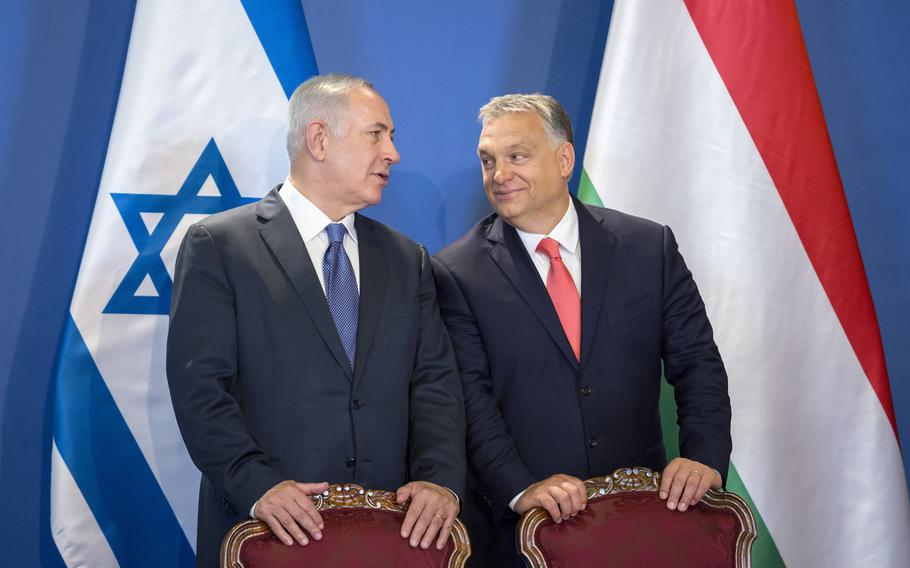
Israeli Prime Minister Benjamin Netanyahu, left, and his Hungarian counterpart Viktor Orban chat as they attend a signing ceremony in the Parliament building in Budapest, Hungary, Tuesday, July 18, 2017. (Balazs Mohai/MTI via AP)
BUDAPEST, Hungary — Israeli Prime Minister Benjamin Netanyahu is scheduled to arrive in Hungary on Wednesday to meet with its nationalist prime minister despite an international arrest warrant for the Israeli leader over the war in the Gaza Strip.
Netanyahu’s four-day visit to Budapest is a sign of both his close relationship with Prime Minister Viktor Orbán and the latter’s growing hostility toward international institutions like the International Criminal Court, of which Hungary is a member.
Orbán, a conservative populist and close Netanyahu ally, has vowed to disregard the ICC warrant, accusing the world’s top war crimes court based in The Hague, Netherlands, of “interfering in an ongoing conflict for political purposes.”
Members of Orbán’s government have suggested that Hungary, which became a signatory to the court in 2001, could withdraw. Currently, all countries in the 27-member European Union are signatories, and all members are required to detain suspects facing a warrant if they set foot on their soil. But the court relies on member countries to enforce that.
The ICC, the world’s only permanent global tribunal for war crimes and genocide, issued the arrest warrant in November for Netanyahu as well as for his former defense minister and Hamas’ military chief, accusing them of crimes against humanity in connection with the war in Gaza after the Hamas attack against Israel on Oct. 7, 2023.
Tens of thousands of Palestinians, many of them children, have been killed during the Israeli military’s response, which it resumed last month while shattering a ceasefire.
The warrants said there was reason to believe Netanyahu and former Defense Minister Yoav Gallant used “starvation as a method of warfare” by restricting humanitarian aid to Gaza, and intentionally targeted civilians in Israel’s campaign against Hamas — charges that Israeli officials deny.
The ICC has criticized Hungary’s decision to defy its warrant for Netanyahu. The court’s spokesperson, Fadi El Abdallah, said it’s not for parties to the ICC “to unilaterally determine the soundness of the Court’s legal decisions.”
Participating states have an obligation to enforce the court’s decisions, El Ebdallah told The Associated Press in an email, and may consult with the court if they disagree with its rulings.
Orbán, regarded by critics as the EU’s most intransigent spoiler in the bloc’s decision-making, is seen as using some of the tactics that Netanyahu has been accused of employing in Israel: subjugation of the judiciary, antagonism toward the EU and cracking down on civil society and human rights groups.
The two leaders are practitioners of “illiberal” governance — a term adopted by Orbán rejecting the tenets of liberal democracy — and are allied with U.S. President Donald Trump, who signed an executive order in February imposing sanctions on the ICC over its investigations of Israel.
For Netanyahu, the visit to Hungary offers another opportunity to defy the ICC warrant and project an image of statesmanship while he faces mounting protests at home.
He has faced mass protests by Israelis who fear his decision to resume the war endangers the lives of the remaining hostages held by Hamas. He has also sparked anger by trying to fire or sideline top officials in what critics view as a power grab and an attack on state institutions.
Along with resuming its offensive in Gaza last month, Israel halted all imports of food, fuel and humanitarian aid to the territory’s 2 million Palestinians to pressure Hamas to release more hostages and accept proposed changes to the truce agreement.
Erika Guevara-Rosas, the head of global research, advocacy and policy of human rights group Amnesty International, said in a statement that Hungary must arrest Netanyahu if he travels there and hand him over to the ICC.
“Hungary’s invitation shows contempt for international law and confirms that alleged war criminals wanted by the ICC are welcome on the streets of a European Union member state,” Guevara-Rosas said.
Liz Evenson, international justice director at Human Rights Watch, said Hungary allowing Netanyahu’s visit “would be Orban’s latest assault on the rule of law, adding to the country’s dismal record on rights.”
In March 2023, the ICC issued an arrest warrant for Russian President Vladimir Putin for war crimes, accusing him of responsibility for the abductions of children from Ukraine. Putin visited Mongolia, which is also a member of the ICC, in September last year, but he wasn’t arrested. Last year, judges found that the country failed to uphold its legal obligations and referred the matter to the court’s oversight body.
Associated Press writers Molly Quell in Amsterdam and Joseph Krauss contributed to this report.